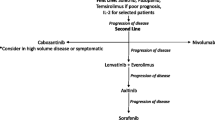Abstract
The multiple tyrosine kinase inhibitor (TKI) cabozantinib (Cabometyx™) is approved in the USA for the treatment of patients with advanced renal cell carcinoma (RCC) who have received prior antiangiogenic therapy. In the EU, cabozantinib is indicated for the treatment of advanced RCC in adults following prior vascular endothelial growth factor (VEGF)-targeted therapy. In adults with advanced or metastatic clear-cell RCC who had previously received VEGF receptor (VEGFR) TKIs, progression-free survival (PFS) and overall survival (OS) were significantly prolonged in patients who received oral cabozantinib versus oral everolimus in the pivotal METEOR trial. Objective response was achieved in a significantly higher proportion of patients receiving cabozantinib than those receiving everolimus. Cabozantinib had a manageable adverse events profile in patients with advanced RCC. Thus, cabozantinib is an important new option for use in patients with advanced RCC who have previously received antiangiogenic therapy.

Reproduced from Choueiri et al. [17] with permission
Similar content being viewed by others
References
Chow WH, Dong LM, Devesa SS. Epidemiology and risk factors for kidney cancer. Nat Rev Urol. 2010;7(5):245–57.
Escudier B, Porta C, Schmidinger M, et al. Renal cell carcinoma: ESMO clinical practice guidelines for diagnosis, treatment and follow-up. Ann Oncol. 2014;25 (Suppl 3):iii49–56.
Grassi P, Verzoni E, Ratta R, et al. Cabozantinib in the treatment of advanced renal cell carcinoma: design, development, and potential place in the therapy. Drug Des Devel Ther. 2016;10:2167–72.
National Comprehensive Cancer Network. NCCN clinical practice guidelines in oncology: kidney cancer (version 3.2016). 2016. http://www.nccn.org. Accessed 2 Nov 2016.
Malouf GG, Flippot R, Khayat D. Therapeutic strategies for patients with metastatic renal cell carcinoma in whom first-line vascular endothelial growth factor receptor-directed therapies fail. J Oncol Pract. 2016;12(5):412–20.
Yakes FM, Chen J, Tan J, et al. Cabozantinib (XL184), a novel MET and VEGFR2 inhibitor, simultaneously suppresses metastasis, angiogenesis, and tumor growth. Mol Cancer Ther. 2011;10(12):2298–308.
Exelixis Inc. Cabometyx™ (cabozantinib) tablets for oral use: US prescribing information. 2016. http://www.accessdata.fda.gov. Accessed 2 Nov 2016.
European Medicines Agency. Cabometyx (cabozantinib) film-coated tablets: EU summary of product characteristics. 2016. http://ec.europa.eu/. Accessed 2 Nov 2016.
Hoy SM. Cabozantinib: a review of its use in patients with medullary thyroid cancer. Drugs. 2014;74(12):1435–44.
Xie Z, Lee YH, Boeke M, et al. MET inhibition in clear cell renal cell carcinoma. J Cancer. 2016;7(10):1205–14.
Zhou L, Liu XD, Sun M, et al. Targeting MET and AXL overcomes resistance to sunitinib therapy in renal cell carcinoma. Oncogene. 2016;35(21):2687–97.
Nguyen L, Benrimoh N, Xie Y, et al. Pharmacokinetics of cabozantinib tablet and capsule formulations in healthy adults. Anticancer Drugs. 2016;27(7):669–78.
Lacy S, Hutmacher MM, Yang B, et al. Population pharmacokinetic (PopPK) and exposure-response (ER) modeling of cabozantinib (C) in patients (pts) with renal cell carcinoma (RCC) in the phase 3 METEOR study [abstract no. 2565 plus poster]. J Clin Oncol. 2016;34(Suppl).
Nguyen LP, Holland JR, Ramies DMD, et al. Effect of renal and hepatic impairment on the pharmacokinetics of cabozantinib. J Clin Pharmacol. 2016;56(9):1130–40.
Choueiri TK, Escudier B, Powles T, et al. Cabozantinib versus everolimus in advanced renal-cell carcinoma. N Engl J Med. 2015;373(19):1814–23.
Motzer RJ, Bacik J, Schwartz LH, et al. Prognostic factors for survival in previously treated patients with metastatic renal cell carcinoma. J Clin Oncol. 2004;22(3):454–63.
Choueiri TK, Escudier B, Powles T, et al. Cabozantinib versus everolimus in advanced renal cell carcinoma (METEOR): final results from a randomised, open-label, phase 3 trial. Lancet Oncol. 2016;17(7):917–27.
Cella D, Escudier B, Tannir N, et al. Quality of life (QoL) in the phase 3 METEOR trial of cabozantinib vs everolimus for advanced renal cell carcinoma (RCC) [abstract no. 816P]. Ann Oncol. 2016;27(Suppl 6):vi282.
Powles T, Motzer RJ, Escudier BJ, et al. Outcomes based on prior VEGFR TKI and PD-1 checkpoint inhibitor therapy in METEOR, a randomized phase 3 trial of cabozantinib (C) vs everolimus (E) in advanced renal cell carcinoma (RCC) [abstract no. 4557 plus poster]. J Clin Oncol. 2016;34(Suppl).
Escudier BJ, Powles T, Motzer RJ, et al. Efficacy of cabozantinib (C) vs everolimus (E) in patients (pts) with advanced renal cell carcinoma (RCC) and bone metastases (mets) from the phase III METEOR study [abstract no. 4558 plus poster]. J Clin Oncol. 2016;34(Suppl).
Eisen T, Sternberg CN, Robert C, et al. Targeted therapies for renal cell carcinoma: review of adverse event management strategies. J Natl Cancer Inst. 2012;104(2):93–113.
Powles T, Staehler M, Ljungberg B, et al. European Association of Urology guidelines for clear cell renal cancers that are resistant to vascular endothelial growth factor receptor-targeted therapy. Eur Urol. 2016. doi:10.1016/j.eururo.2016.06.009.
Acknowledgements
During the peer review process, the manufacturer of cabozantinib was also offered an opportunity to review this article. Changes resulting from comments received were made on the basis of scientific and editorial merit.
Author information
Authors and Affiliations
Corresponding author
Ethics declarations
Funding
The preparation of this review was not supported by any external funding.
Conflict of interest
Z T. Al-Salama and G.M. Keating are salaried employees of Adis/Springer, are responsible for the article content and declare no relevant conflicts of interest.
Additional information
The manuscript was reviewed by: M. Fukudo, Department of Hospital Pharmacy and Pharmacology, Asahikawa Medical University, Asahikawa, Japan; P. Marchetti, Medical Oncology, Sapienza University of Rome and IDI-IRCCS, Rome, Italy; U. Vaishampayan, Division of Haematology/Oncology, Department of Medicine, Wayne State University School of Medicine, Detroit, MI, USA.
Rights and permissions
About this article
Cite this article
Al-Salama, Z.T., Keating, G.M. Cabozantinib: A Review in Advanced Renal Cell Carcinoma. Drugs 76, 1771–1778 (2016). https://doi.org/10.1007/s40265-016-0661-5
Published:
Issue Date:
DOI: https://doi.org/10.1007/s40265-016-0661-5




